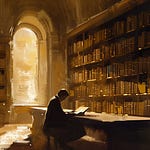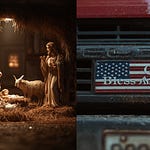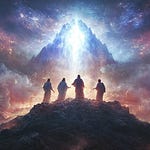We’ve talked a lot about healthy and disordered nationalisms, but today, let’s talk about the American civil religion. Why? It’s the nationalism American children are taught, the means through which we embed our American identity in our citizens. We need to discuss it because there’s solid evidence that the American civil religion is at the heart of our divisions today.
E Pluribus Unum, Our Civic Canon, & Civic Virtue
Since 1873, just after our Civil War, we have had a law that requires us to print our national motto, E pluribus unum, on all our coinage. It’s also on the dollar bill. E pluribus unum: out of many, one. E pluribus unum names our aspiration to become a people united in constructing a common life based on specific shared values and commitments. Ideas and leaders who divide us work against this grand aspiration. Out of many, one.
If you comprehend that American aspiration, you can understand the American civil religion. It’s the peoplehood story we share as we strive to construct an American identity that aims to achieve a neighborly unity nourished by our diversity.
That peoplehood story – or nationalism – is our way of conveying the transcendent values that matter most to that aspiration. I call it a story, but it’s something we convey not just with words but with practices like saying the Pledge of Allegiance, singing our national anthem, including prayers for our country in worship, preserving monuments and memorials in our midst, celebrating birthdays of American heroes, and through rituals like our 4th of July and Thanksgiving celebrations.
The American civil religion remembers heroes like George Washington, Thomas Jefferson, Abraham Lincoln, Theodore Roosevelt, and Martin Luther King, Jr. It draws upon a civic canon—an American Bible if you will—that includes identity-shaping documents such as the Declaration of Independence, our Bill of Rights, Lincoln’s Gettysburg Address, FDR’s Four Freedoms, and MLK’s “I Got a Dream” speech.
Collectively, our civil religion fuels a shared American dream of becoming a free people who govern ourselves for the common good. That common good ethic includes our shared commitment to protect those whose political and economic insecurity is denoted by the biblical metaphor of the widow, orphan, and resident alien from arbitrary power.
It calls us to embody the belief that all are equal in our essential human dignity.
It teaches that all Americans are called to sacrifice so that our neighbors might flourish.
Our American civil religion also teaches us the importance of humility, recognizing human frailty and sinfulness. It teaches us to respect democratic institutions as essential but insufficient protections of our liberty and freedom and, therefore, regards civic virtue as the ultimate means of ensuring the common good.
So, above all, our American civil religion is about cultivating that civic virtue that must be cherished if we are ever to embody E pluribus unum -out of many, one.
The American civil religion is supposed to unite us but too often divides us.
That ought not to be surprising at one level because all healthy and disordered nationalisms are curated at home and in our communities, and they compete in the public square for influence. I call them peoplehood stories to highlight that they evolve as they compete, come into contact with competing perspectives, and adapt to events and changes in our lives.
So, no static and monolithic American peoplehood story encapsulates our values and commitments. There have always been many.
Some people older than me nostalgically recall when we all seemed to be on the same page regarding our American identity. However, that homogeneity is a romantic myth, an illusion created by segregation’s walls. America has always been a work in progress.
While there may have been a relatively common American civil religion in the post-WW2 era, today, we can identify two strands, distinct from Christian nationalism and radical secularism. They teach competing accounts of America, generate different worldviews, and emphasize different values and commitments.
Political scientists call these the priestly and prophetic strands of the American civil religion. Sometimes, they promote two mutually exclusive narratives. The “priestly” strand defends America’s status quo, deeds, and structures, most often justifying the status quo by celebrating American exceptionalism themes. In contrast, the “prophetic” discourse contrasts America’s deeds and structures with its ideals and calls for reform.
To understand how these differences play out, consider that the two strands of civil religion generate different responses to the following questions: (1) Should school kids recite the Pledge of Allegiance at school each day? (2) Is “in God We Trust” out of place on the dollar bill? (3) True or False: Burning the American flag is wrong because it is sacred.” (4)” Freedom must be for everyone to be the ‘land of the free.’(5) “We must make amends for our country’s original sins.”
Two important takeaways from this survey of American civil religion:
(1) We agree more than we disagree.
Though the two strands diverge in how they answer those questions, they agree more than they disagree on the American values and commitments they proclaim.
They agree that what ultimately binds us together is our commitment to live under the rule of law rather than our passions. All citizens should be bound by the same law, regardless of gender, skin hue, creed, or national origin.
They agree that our goal is to create a society where we govern ourselves for the common good, not just for one segment of our people. This distinguishes both forms of American civil religion from Christian nationalism, which, as the oxymoron it is, imagines a society governed by and for the benefit of an Anglo-Protestant segment of our people.
It’s important to remember that both strands of the American civil religion vastly outnumber those who advocate Christian nationalism.
(2) The two strands can divide more than unite us
Our two major political parties have tried to co-opt the strands, raising the existential stakes for us. The priestly strand permeates Republican politics, while the prophetic strand is entrenched among Democratic partisans. Why is that important to know?
Historically, faith communities have been a significant source of our identity and belongingness. But as participation in faith communities has waned, identification as a Republican or Democrat has displaced religious identities, and belongingness to our political party has replaced the belongingness that once came through participation in a faith community.
Faithfulness to our party is now how many meet our existential need for belongingness. That changes radically what’s at stake when a political leader insists we embrace blatant falsehoods or attitudes that contradict the transcendent values of American civil religion.
It’s now a matter of being cast out of the community that fulfills our hunger for belongingness. That’s a recipe for an identity crisis. You perform your identity as an American through participation in that political community, but that community now requires claims and behaviors contradicting your values and commitments.
What do you do? To preserve their sense of belongingness, many will perform extraordinary feats of mental gymnastics to rationalize outrageous lies or behaviors. They choose to be willfully blind to the contradiction.
But returning to the higher ground is hard once you debase yourself like that. It takes extraordinary courage to risk your sense of belongingness to stand up for truth and America’s highest values. But, as our American civil religion reminds us, that’s what American heroes do.
If that describes you, I pray you’ll choose to be an ordinary hero and return to the higher ground where you belong.
Now that we know that the vast majority of Americans share some strand of the American civil religion, we will turn in our next video to understanding a clear and present danger to both the Church and State: Christian Nationalism. Godspeed.











